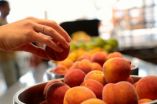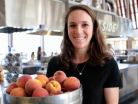(Press-News.org) (Santa Barbara, Calif.) — As the largest purchaser of wholesale produce in Santa Barbara County, UC Santa Barbara's residential dining services provided the perfect avenue for a pilot project incorporating local pesticide-free or certified organic produce into an institutional setting.
The idea was conceived almost 10 years ago, when a group of students approached environmental studies professor David Cleveland about becoming a faculty adviser for student-led sustainable living classes. The group wanted to explore how to bring more local organic food in the dining halls. In 2010 Cleveland and a group of student researchers began documenting the process, which led to the publication of a paper in the Journal of Rural Studies.
A confluence of factors helped to support the project, including an UC-wide initiative to purchase local produce. At the same time, Santa Barbara County farmers were in need of an alternative local food hub to wholesale their produce to local institutional users. Farmer Direct Produce (FDP) — now Harvest Santa Barbara — filled that gap by serving as the wholesale link between farmers and UCSB and other outlets.
Residential dining services at UCSB provide about 10,000 meals a day — 2.5 million meals a year — so the task could have been daunting. Instead, the organizers started small, adding five or six local and organic items to the salad bar. Scaling up slowly turned out to be key to the project's success.
"One of the conclusions of the paper is that it is an iterative process," Cleveland said. "You always have to begin where you are; you can't make a total radical transformation. You figure out how to gradually move in the direction you want to go and then make incremental changes."
While local food systems have increased in popularity in recent years, the majority of the food system is still dominated by large-scale national and global networks. "The entire food system is oriented toward large players and oriented to maximize their profit, not maximize environmental benefit or social benefit or nutritional benefit or community benefit," Cleveland said.
The challenge for FDP and UCSB was to create a viable operation for all parties involved, which meant moving beyond the profit-dominated mentality of the mainstream food system.
Personal relationships built on trust turned out to be important elements. FDP's Wesley Sleight and Anna Breaux knew the farmers whose crops they purchased; the pair also developed a good working relationship with Terry Thomas, systems analyst with residential dining services, and Bonnie Crouse, assistant director of residential services, both now retired from UCSB. There was commitment on both sides to reach the same goal: scaling up the amount of locally grown pesticide-free or organic produce used in UCSB dining halls.
"It's often not possible to maximize social, environmental and economic sustainability at the same time," Cleveland explained. "There are tradeoffs, conflicts. The 'triple bottom line' in mainstream business really means that economic goals are first and they'll work on the other ones as long as it increases their profit. The UCSB-FDP collaboration turned that upside down because it was viewed as a community project in which all of the parties valued the non-monetary benefits of their work as much as or more than the financial benefits."
Initially, students had minor concerns because the organic produce often didn't look the same as its conventional counterparts in grocery stores. Education was key. The concerns diminished once the students began to understand the benefits of choosing seasonal, locally grown produce. Dining hall chefs also had to be educated so they would embrace ordering from FDP and understand the worth of the extra effort involved in using local produce. Despite these learning curves, by 2010 — five years into the project — UCSB was buying 100,000 pounds of produce from FDP. In 2012, FDP was sold and renamed Harvest Santa Barbara.
"We're always striving to increase the amount of sustainable produce we purchase, and having that relationship with Harvest Santa Barbara and supporting our community is wonderful," said Danielle Kemp, residential dining services' dietitian, "because without them we wouldn't be able to purchase from local farmers. Because of Harvest Santa Barbara, our student interns have formed relationships with local farmers and are able to bring back what they learn from farmers to educate their peers. These relationships and education for students are key."
INFORMATION:
The added value of local food hubs
A case study of UCSB's residential dining services shows that serving local and sustainable produce benefits the community at large
2014-05-20
ELSE PRESS RELEASES FROM THIS DATE:
Central Valley sees big drop in wintertime fog needed for fruit and nut crops
2014-05-20
BERKELEY — California's winter tule fog -- hated by drivers, but needed by fruit and nut trees -- has declined dramatically over the past three decades, raising a red flag for the state's multibillion dollar agricultural industry, according to researchers at the University of California, Berkeley.
Crops such as almonds, pistachios, cherries, apricots and peaches go through a necessary winter dormant period brought on and maintained by colder temperatures. Tule fog, a thick ground fog that descends upon the state's Central Valley between late fall and early spring, helps ...
New analysis eliminates a potential speed bump in quantum computing
2014-05-20
A quantum particle can search for an item in an unsorted "database" by
jumping from one item to another in superposition, and it does so
faster than a classical computer ever could.
This assertion assumes, however, that the particle can directly hop from any item to any other. Any restriction on which items the particle can directly hop to could slow down the search.
"Intuition says that a symmetric database allows the particle to hop freely enough to retain the quantum speedup, but our research has shown this intuition to be false," says Tom Wong, a physicist at ...
Penn team identifies promising new target for gum disease treatment
2014-05-20
Nearly half of all adults in the United States suffer from the gum disease periodontitis, and 8.5 percent have a severe form that can raise the risk of heart disease, diabetes, arthritis and pregnancy complications.
University of Pennsylvania researchers have been searching for ways to prevent, half and reverse periodontitis. In a report published in the Journal of Immunology, they describe a promising new target: a component of the immune system called complement. Treating monkeys with a complement inhibitor successfully prevented the inflammation and bone loss that ...
A full serving of protein at each meal needed for maximum muscle health
2014-05-20
Most Americans eat a diet that consists of little to no protein for breakfast, a bit of protein at lunch and an overabundance of protein at dinner. As long as they get their recommended dietary allowance of about 60 grams, it's all good, right?
Not according to new research from a team of scientists led by muscle metabolism expert Doug Paddon-Jones of the University of Texas Medical Branch at Galveston. This research shows that the typical cereal or carbohydrate-dominated breakfast, a sandwich or salad at lunch and overly large serving of meat/protein for dinner may not ...
Cognitive test can differentiate between Alzheimer's and normal aging
2014-05-20
CHAMPAIGN, Ill. — Researchers have developed a new cognitive test that can better determine whether memory impairments are due to very mild Alzheimer's disease or the normal aging process.
Their study appears in the journal Neuropsychologia.
The Alzheimer's Association estimates that the number of Americans living with Alzheimer's disease will increase from 5 million in 2014 to as many as 16 million by 2050. Memory impairments and other early symptoms of Alzheimer's are often difficult to differentiate from the effects of normal aging, making it hard for doctors to ...
School-based interventions could benefit children from military families
2014-05-20
COLUMBIA, Mo. – Nearly 2 million children in the United States have experienced a parent's military deployment. Previous research has shown that these children may be at increased risk for emotional, behavioral and relationship difficulties, yet little is known about how best to address military children's specialized needs. Now, an MU researcher says school-based interventions could benefit children whose parents have deployed.
David Albright, an assistant professor at the MU School of Social Work, says military children are an overlooked population in need ...
Unlocking the potential of bacterial gene clusters to discover new antibiotics
2014-05-20
Resistance to antibiotics has been steadily rising, posing a threat to public health. Now, a method from Mohammad Seyedsayamdost, an assistant professor of chemistry at Princeton University, may open the door to the discovery of a host of potential drug candidates.
The vast majority of anti-infectives on the market today are bacterial natural products, made by biosynthetic gene clusters. Genome sequencing of bacteria has revealed that these active gene clusters are outnumbered approximately ten times by so-called silent gene clusters.
"Turning these clusters on would ...
Receptive to music
2014-05-20
This news release is available in German. Music can be soothing or stirring, it can make us dance or make us sad. Blood pressure, heartbeat, respiration and even body temperature – music affects the body in a variety of ways. It triggers especially powerful physical reactions in pregnant women. Scientists at the Max Planck Institute for Human Cognitive and Brain Sciences in Leipzig have discovered that pregnant women compared to their non-pregnant counterparts rate music as more intensely pleasant and unpleasant, associated with greater changes in blood pressure. Music ...
Update for Skunk Fire, Arizona
2014-05-20
The Skunk Fire which began as a lightning strike on Saturday, April 19 is currently 31,167 acres large including fire growth and back burns.The fire continues to move in a north westerly direction and an easterly direction towards ponderosa pine forest. South and North side of the fire is contained. The terrain for this fire is steep with scattered boulders making firefighting more difficult. The entire fire is currently 44% contained and full containment is expected by Friday, May 23, according to Inciweb.org.
The National Weather Service has forecast maximum temperatures ...
Boosting Immune process with IFN-γ helps clear lethal bacteria in cystic fibrosis
2014-05-20
Boosting a key immune process called autophagy with interferon gamma (IFN-γ) could help clear a lethal bacterial infection in cystic fibrosis, a new study suggests. The work, led by a team in The Research Institute at Nationwide Children's Hospital and published in PLoS One in May, offers new information about immune function in patients with the disease.
Cystic fibrosis, CF for short, is caused by a malfunction in the CFTR gene, which is responsible for transporting chloride and water across cell membranes. In people with the disease, cells that line the passageways ...
LAST 30 PRESS RELEASES:
ASU researchers to lead AAAS panel on water insecurity in the United States
ASU professor Anne Stone to present at AAAS Conference in Phoenix on ancient origins of modern disease
Proposals for exploring viruses and skin as the next experimental quantum frontiers share US$30,000 science award
ASU researchers showcase scalable tech solutions for older adults living alone with cognitive decline at AAAS 2026
Scientists identify smooth regional trends in fruit fly survival strategies
Antipathy toward snakes? Your parents likely talked you into that at an early age
Sylvester Cancer Tip Sheet for Feb. 2026
Online exposure to medical misinformation concentrated among older adults
Telehealth improves access to genetic services for adult survivors of childhood cancers
Outdated mortality benchmarks risk missing early signs of famine and delay recognizing mass starvation
Newly discovered bacterium converts carbon dioxide into chemicals using electricity
Flipping and reversing mini-proteins could improve disease treatment
Scientists reveal major hidden source of atmospheric nitrogen pollution in fragile lake basin
Biochar emerges as a powerful tool for soil carbon neutrality and climate mitigation
Tiny cell messengers show big promise for safer protein and gene delivery
AMS releases statement regarding the decision to rescind EPA’s 2009 Endangerment Finding
Parents’ alcohol and drug use influences their children’s consumption, research shows
Modular assembly of chiral nitrogen-bridged rings achieved by palladium-catalyzed diastereoselective and enantioselective cascade cyclization reactions
Promoting civic engagement
AMS Science Preview: Hurricane slowdown, school snow days
Deforestation in the Amazon raises the surface temperature by 3 °C during the dry season
Model more accurately maps the impact of frost on corn crops
How did humans develop sharp vision? Lab-grown retinas show likely answer
Sour grapes? Taste, experience of sour foods depends on individual consumer
At AAAS, professor Krystal Tsosie argues the future of science must be Indigenous-led
From the lab to the living room: Decoding Parkinson’s patients movements in the real world
Research advances in porous materials, as highlighted in the 2025 Nobel Prize in Chemistry
Sally C. Morton, executive vice president of ASU Knowledge Enterprise, presents a bold and practical framework for moving research from discovery to real-world impact
Biochemical parameters in patients with diabetic nephropathy versus individuals with diabetes alone, non-diabetic nephropathy, and healthy controls
Muscular strength and mortality in women ages 63 to 99
[Press-News.org] The added value of local food hubsA case study of UCSB's residential dining services shows that serving local and sustainable produce benefits the community at large








